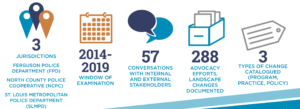The State of Police Reform: What has and hasn’t changed in St. Louis policing?
For the second installment in our State of St. Louis series, we have completed an in-depth exploration of changes made in the law enforcement space. Called the State of Police Reform, we set out to answer three core questions about police reform since the killing of Michael Brown and release of the Ferguson Commission Report.
- What has changed? What police reform calls to action have been implemented?
- What factors have facilitated change?
- What factors have held it back?
“We need to be clear about our goal: to set a new culture and climate for public safety that is deeply committed to building a healthy and thriving community. This is fundamentally different from a vision of policing that focuses on law and order without a clear understanding of the root causes of violence and crime, which have just as much (if not more) to do with the structural drivers of poverty, limited options, and divestment as they do with individual decisions and behavior. Diagnosis determines treatment.” –State of Police Reform

We choose three police departments (Ferguson Police Department, North County Police Cooperative, and St. Louis Metropolitan Police Department), conducted 57 conversations with key stakeholders both inside and outside the departments, and documented 288 events. However, we saw three fairly different narratives of reform when we looked at timecourse graphs for each department.
The report also discusses disparities in policing, courts, education, healthcare, housing, and income and how those disparities—disproportionately borne by Black people, family, children, and communities—cost the entire St. Louis region. In fact, the St. Louis Region lost more than $17 billion due to racial disparities in income. The report concludes with the results from a survey we circulated at two points, 2016 and 2019. We found that most people do not feel like much has changed, a result that necessitates a conversation on why the outlook is so dismal.
“So, we close with the uncomfortable fact that progress is small, and can seem excruciatingly slow, and beset by failed and superficial attempts. But it’s here. Change is happening, and that means we can learn from it, and try to do better moving forward.” –State of Police Reform
